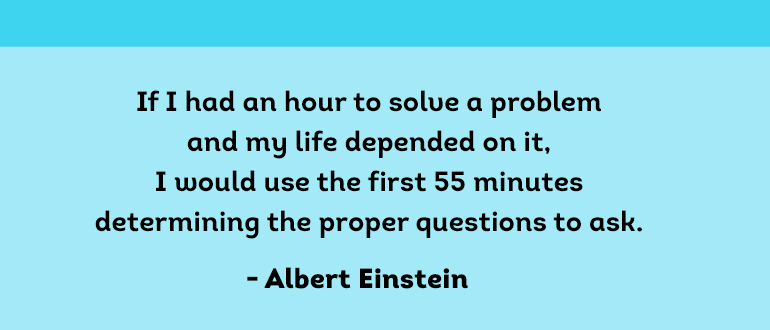A marketing research process isn’t just a leisurely visit on Wikipedia, nor is it getting caught with the Google search bar and emerging with whatever was closest to the top. You need to establish a plan of attack and focus on what it really is you need to ask to find the right answers.
It’s much easier to use what’s working already, using what other bloggers and marketers have dug up, slice and dice it with your own twist. I’ve done it, too. Sometimes we are under a time crunch, and that is why we grab at the low-hanging fruit.
So where should you start your content marketing research process? You just need to know how to do great research, and it starts with being good with questions.
1. Finding Good Questions
Your content has the final goal of providing your reader or audience with interesting new information. Typically, the first step in creating that lovely content is to start with the questions you yourself have.

This is actually one of the trickiest parts of the content marketing research process.
Once you know the right questions, finding related information isn’t that difficult. So how do you find the right questions?
- Find the question communities. Why aimlessly search for things on Google, just go where other people ask questions, like Quora. If you already have a general idea of the category, you can easily find the questions hundreds of people are asking within that topic. And if you look close enough to the discussion boards, you’ll find the exact terms and phrases you need to do additional research on your own.
- Start with your own curiosity. What types of questions come to mind? When faced with something we don’t know, most of us are curious and have a natural tendency to ask foundational questions (e.g. How does it work? Who made it? Is it healthy?). These are the sorts of introductory questions that provide you with the next level of understanding which helps you brainstorm better questions.
- Confront any of your assumptions. What do you assume about a topic? Even when we don’t know a topic very well, we still form assumptions about it out of habit. Use those initial assumptions, create questions that challenge them, and honestly look for the answer.
Asking the right question is pretty much a Catch 22.
If you know nothing about a certain subject, you have to ask questions to get enough reliable information to finally ask the right question.
Often, we don’t like doing that. It’s where the “there are no dumb questions” mantra comes into play. We feel foolish asking such obvious questions, but don’t worry, everyone else you know is bound to be asking silly questions online too.
I’m a firm believer you can learn just about anything you want if you know the right questions to ask.
Anything I missed on the topic? Drop me a question below 🙂
~ Stay grinding